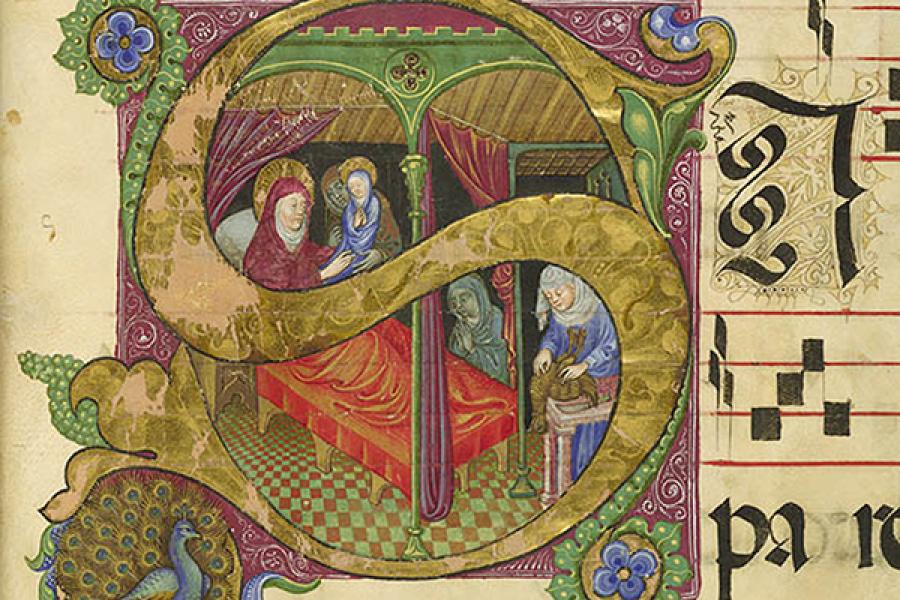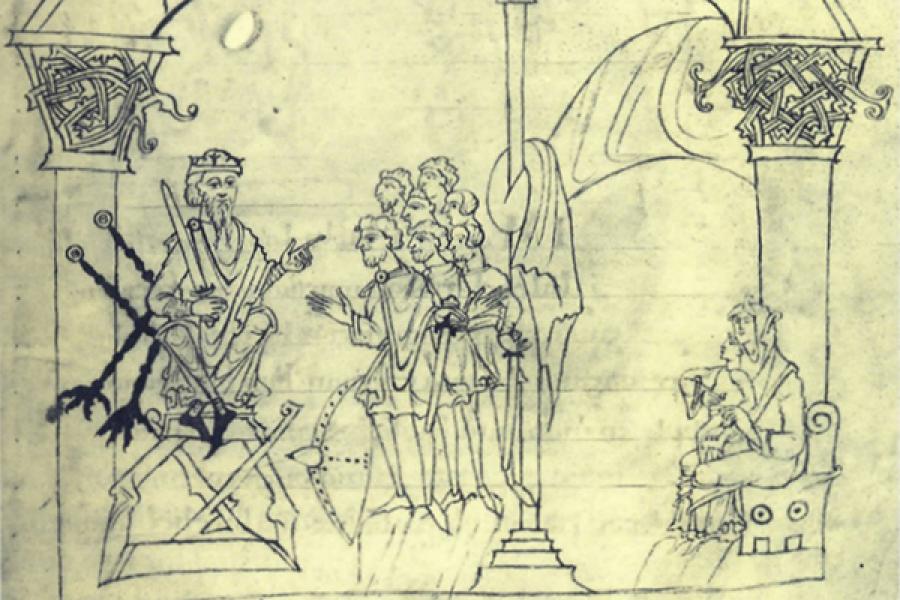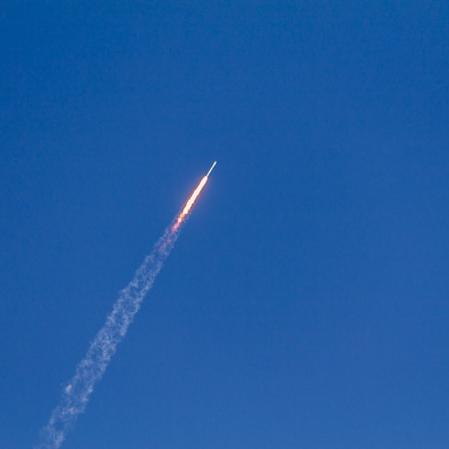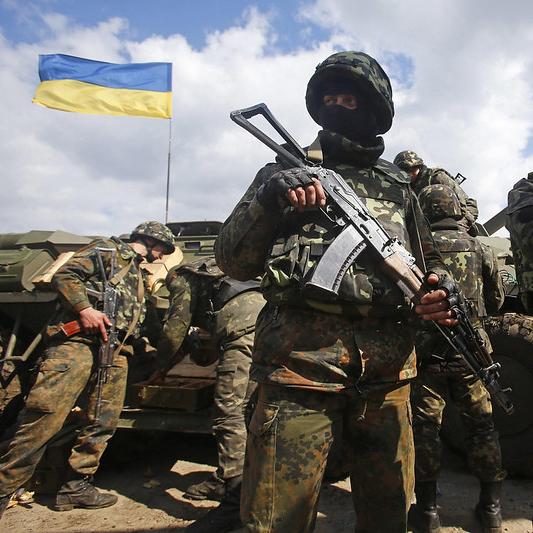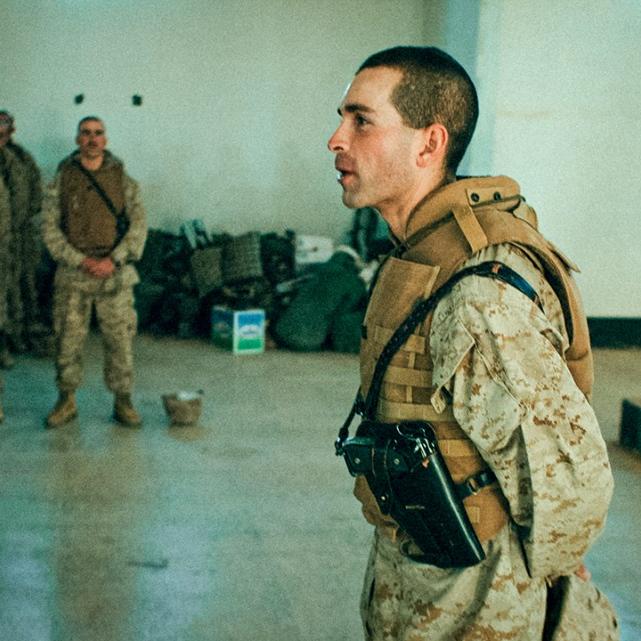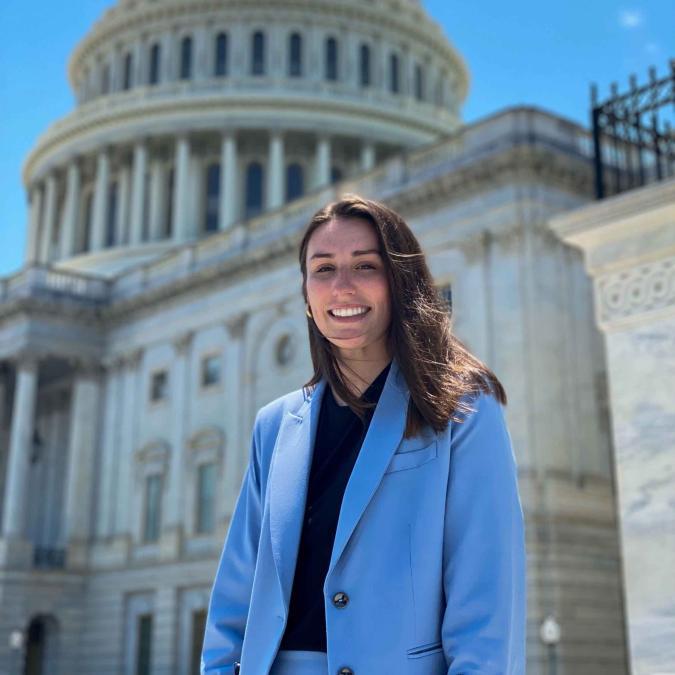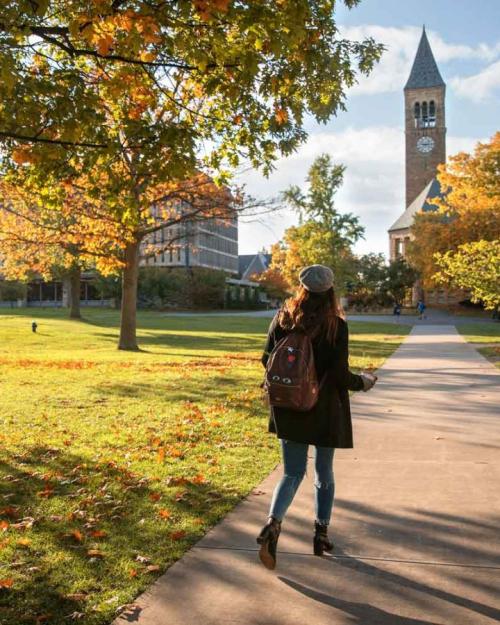Fifty years since its founding, the Medieval Studies Program is thriving, says Alice Colby-Hall, a founding member of the program. “Cornell’s medievalists and their students are as enthusiastic as ever and still discover ground-breaking connections between the different disciplines within the field.”
On Monday, May 9, at 3:30 p.m., the Medieval Studies Program celebrated its 50th anniversary in Kaufman Auditorium, Goldwin Smith Hall.
The celebration featured a ceremony honouring three charter members of the Program: Colby-Hall, professor emerita of Romance studies, James John, professor emeritus of history, and Brian Tierney, Bryce & Edith M. Bowmar Professor in Humanistic Studies, Emeritus; and a roundtable discussion by medieval studies faculty reflecting on the history of the program and changes over time.
The keynote speech was delivered by Don Randel, Professor Emeritus of Musicology, Chairman of the Board of the American Academy of Arts and Sciences, former dean of the College of Arts & Sciences and former Cornell University provost. In his talk, titled “What’s the Middle Ages Got to Do with It?” Randel reflected on the relationship between his training as a medievalist and his career in public (academic) service. A reception followed in the Groos Family Atrium in Klarman Hall.
Why Medieval?
“Program faculty study the medieval period from wide-ranging perspectives in an effort to better understand the human condition. Many of the issues we explore in medieval studies resonate with issues that confront modern society,” says Director David Powers, professor of Arabic and Islamic studies in the Department of Near Eastern Studies and an adjunct professor of law in the Law School.
To illustrate this point, Powers noted that a book on the Middle Ages by a distinguished Cornell medievalist was reprinted by the U.S. Army and distributed to soldiers during World War II, in order to give them a better understanding of European society.
The Program
The Medieval Studies Program consists of 29 faculty members from 12 departments across the College of Arts & Sciences, including archaeology, art history, Asian studies, classics, comparative literature, English, German studies, history, linguistics, music, Near Eastern studies, philosophy and Romance studies.
“Medieval studies is almost by definition interdisciplinary,” says Thomas Hill, professor of English. “The boundaries between disciplines are fluid.”
The faculty offer expertise in a wide array of disciplines and area studies spanning more than a millennium of languages and cultures—from Old and Middle English literature to Byzantine monuments; from Viking studies to Andalusian architecture; from Chinese intellectual history to Islamic legal history. Gender studies, ethics and morality, aesthetics, religion and politics, migration, climate change, and many other themes are explored.
“The Medieval Studies program offers fantastic opportunity for interdisciplinary collaboration across departments,” says graduate student Ruth Mullett . “I have worked with faculty, staff and students from art history, English, history, music, chemistry, architecture, the Johnson Museum, and Olin and Kroch libraries. This has certainly enriched my experience and given me inspiration for new projects outside of my discipline.”
Although Cornell’s program has particular strengths in the study of Europe, it encompasses the world, with medievalists specializing in Asia and Islam. “Our global approach to medieval studies is one of the strengths of Cornell’s program,” says Powers.
“Students have a great deal of freedom to define their own program,” notes Hill. “Students working with English professors on literature might also go to Europe and work on an archaeological site. The diversity of options has been part of our program since the beginning.”
Says Mullett, “As someone who works directly with medieval manuscripts and is originally British, I often get asked why I left the UK to study at Cornell. In fact, I probably have more opportunity to work with manuscripts here at Cornell than I would at home. Kroch Library has a surprisingly comprehensive collection of medieval manuscripts and fragments, and nearly every year I have had the opportunity (and the funding) to travel to Europe to see manuscripts in situ. I think this is a privilege not many students of medieval studies, wherever they are in the world, are given.”
Medieval Studies is the only program in the College of Arts & Sciences that confers doctoral degrees, accepting two to three new students per year. Currently there are 16 graduate students in the Medieval Studies Program, plus 10 medievalists in other graduate fields.
“The most meaningful and surprising part of my time with this program has been the freedom to explore and develop my own research interests,” says graduate student Hannah Byland, whose research focuses on visionary literature of 14th-century England. “I know it's not just my luck of having a great committee; nearly every grad will attest that the way this program champions its students is remarkable.”
A Community of Scholars
The Program attracts excellent graduate students who are energetic and self-directed, says Powers, and they use their energy to good effect, organizing numerous events over the course of the year, including a monthly Medieval Roundtable to read and critique a chapter of one of their dissertations; an annual Medieval Studies Student Colloquium; and a work-in-progress discussion group.
“What I think it truly special about our program is just how passionate all the Medieval Studies students are about their work, the program, and the cause of medieval studies more broadly,” says Byland. “I'm graduating next year and the thing I'll miss most is this engaged and incredibly supportive community.“
Quodlibet, the undergraduate society for Medieval Studies (in which graduate students participate) is also very active, organizing fall and spring guest lectures by non-Cornell medievalists.
Fostering an institutional sense of community has always been an important component of the program, says Powers. Each December medievalists from across departments and programs congregate for Medieval Readings, an evening of food, drink, and the recitation of poetry and prose in languages current at different times and in many places throughout the medieval world.
This year, Powers introduced a monthly Brown Bag Lunch series for faculty and students, which has proved popular, with good attendance.
The program also has active Reading Groups in Old English, Medieval Latin, Old French, Old Norse and Medieval Philosophical Texts. Faculty and graduate students participate, with undergraduates welcome.
A working group on Medieval Cosmology, founded in 2013, has proved prolific. The three founders of the group each have books coming out this year: “Cosmos and Community in Medieval Art,” by art historian Benjamin Anderson; “Composing the World: The Harmony of the Medieval Platonic Cosmos,” by musicologist Andrew Hicks, and “Technical Ekphrasis in Ancient Science: The Written Machine between Alexandria and Rome,” by classicist Courtney Roby, published in February.
A Short History
Medieval studies at Cornell dates back to 1865 and medievalist Andrew Dickson White, co-founder of the university and its first president. White hired a number of important medievalists during his tenure as president, including Thomas “Teefy” Frederick Crane, immortalized in the opening line of the Cornell fight song, “Give My Regards to Davy/Remember me to Teefy Crane.”
“Several medievalists served as presidents and acting presidents of Cornell,” notes Powers. “These were people with wide and expansive horizons, polyglots, interested in manuscripts, books, maps, art, sculpture, language, folk tales, diplomacy, and politics.”
In 1937, fifteen professors in the College of Arts and Sciences established the “Friends of Medieval Studies" committee, according to the Cornell Alumni News, “to maintain Cornell's acknowledged leadership in a field of increasing significance….Those who are trying to see through the tangled confused mess of modern society will appreciate the importance of this movement to study the society out of which modern society has grown."
In 1966, the College of Arts and Sciences had a stellar group of medievalists on its faculty, and these faculty members, led by Professors Robert Kaske and James Marchand, and including Colby-Hall, Brian Tierney and James John, lobbied vigorously for the creation of a medieval studies program that would train not only undergraduates but also graduate students.
In August of 1966, Dean of the Graduate School W.D. Cooke agreed to the creation of a new graduate field, noting that medieval studies “represents a rather unique situation at Cornell in that we have an unusually large number of faculty with an interest in this area of study...some of the most promising professors in the Humanities were backing the proposal very strongly and a rejection would cause extensive unhappiness.”
Arthur Groos, Avalon Foundation Professor of the Humanities in the Department of German Studies, recalls that at the founding of Medieval Studies there was a “palpable sense of excitement about this new way to study a historical period that seemed to demand the kind of cross-disciplinary work that Cornell offered, but also the thrill of ongoing intellectual exchanges with professors outside of class, on campus or in their homes.”
By the 1980s, Medieval Studies had almost doubled in size to a critical mass of some sixteen graduate students – and in one of those years they included two former Rhodes Scholars and two former Marshall Fellows, according to Groos, who served as director of the program for ten years, from 1974-79 and 1981-86
Noted alumni
The outbreak of World War II took Cornell students of medieval studies to unexpected places. One of these students, Barber Benjamin Conable ’42, was sent to the Pacific front as a U.S. Marine, where he learned to speak Japanese and fought in the Battle of Iwo Jima. He later became an influential Republican Party politician who represented upstate New York in the House of Representatives from 1965 until 1985. In 1986, President Ronald Reagan appointed Conable as President of the World Bank.
The program continues to be highly successful with job placement for its graduate students; in the last seven years there has been 100% employment in academic tenure-track positions. Thirty-seven of the program’s graduates currently hold or have held academic positions at schools such as the University of Michigan, University of California, Notre Dame, Loyola (New Orleans), Georgetown, Saint Louis University, Union College, Washington and Lee, William and Mary, and the University of Maine.
Other noted alumni include Niall Brady Ph.D. ’96, who is Project Director of the Medieval Rural Settlement Project of The Discovery Programme, an archaeological research institution dedicated to investigating Ireland’s past. He’s also Director of the Archaeological Diving Company Ltd, a private-sector consultancy that specializes in underwater and related archaeological work in Ireland and Britain. Mary Wack Ph.D. ’82 is Vice Provost for Undergraduate Education at Washington State University, and Suzanne Hagedorn Ph.D. ’95 is Director of the Medieval & Renaissance Studies Program at The College of William & Mary.

